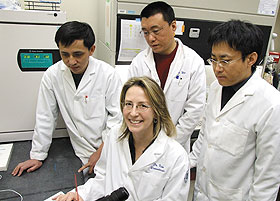Feature Story
As published in the UConn Advance, February 17, 2009.
Biomaterials Engineer Receives State Award for Innovation
By Chris DeFrancesco

Liisa Kuhn (seated) with, from left, postdoctoral fellows Guomin Ou, Bo Wen, and Yongxing Liu in a biomaterials lab at the UConn Health Center.
Photo by Chris DeFrancesco
Liisa Kuhn’s biomaterials engineering research could ultimately lead to tissue regeneration or a new cancer treatment, perhaps even a cure.
Her work may not be used in the clinic quite yet, but its promise impressed the Connecticut Technology Council enough to name her a 2009 Women of Innovation Award winner.
Kuhn, an assistant professor in the Center for Biomaterials and Regenerative Medicine at the UConn Health Center, was one of 10 winners among 52 finalists, all considered “innovators, role models, and leaders in the technology, science, and engineering fields” by the Connecticut Technology Council, the state’s industry association for the technology sector.
Kuhn took top honors in the Academic Innovation and Leadership category.
“Dr. Liisa Kuhn brings innovation to the academic environment through the most effective of means, her own example,” wrote Center for Biomaterials director Jonathan Goldberg in his nomination.
“Dr. Kuhn is actively sought by students as a mentor and by faculty as a research collaborator. As evidenced by her numerous students and funded grants, she brings an innovative perspective on how materials engineering can address a wide range of clinical problems.”
Kuhn worked in industry before joining the Health Center faculty, and brings her industrial innovation experiences to the classroom.
Goldberg says, “Liisa’s work is a prime example of how we bring real life problems and examples to the classroom, and translate research back to real life solutions.”
Rebuilding bone
Kuhn, Goldberg, and other UConn scientists are studying how
embryonic stem cells could rebuild bone, cartilage, muscle, and
skin. Last fall, CPTV’s Positively Connecticut program featured
Kuhn’s work toward getting stem cells to differentiate into bone,
highlighting how it could avert a painful surgical step for dental
implant patients who require bone grafting. It’s something she
predicts may be possible within 10 years.
Kuhn also is exploring the use of nanoparticles to deliver high doses of chemotherapy to cancer cells.
The nanoparticles are made of calcium phosphate, the same substance that when prepared as stable layers of material stimulates stem cells to become bone cells.
“The innovation in the cancer field comes from using nanometer-sized particles of calcium phosphate,” Kuhn says.
“The nanoparticles will not support bone growth, in fact they promote bone destruction, and thus potentially the destruction of cancer. It’s this sort of yin/yang relationship within biomaterials research that makes it fascinating.”
Kuhn was also a Women of Innovation finalist in 2008 and 2006.
“The award has a unique place in my heart because it recognizes women in science and technology,” she says, “and provides publicity enabling other women to hear about a positive role model. The idea of trying to mentor young women in science is part of the Connecticut Technology Council’s goal, and that’s part of what my being acknowledged in this manner helps us do.”
UConn had six finalists for this year’s Women of Innovation Awards: Amy Howell, professor of chemistry, also in the Academic Innovation and Leadership category; Jun-Hong Cui, associate professor of computer science and engineering, and Susanne Yelin, associate professor of physics, were finalists for the Research Innovation and Leadership Award; Donna Cyr, the Health Center’s director of technology licensing, was a finalist for the Large Business Innovation and Leadership Award; and Emily Neumann, who graduated with a bachelor’s in English and journalism last year, was in the Collegian Innovation and Leadership category.


